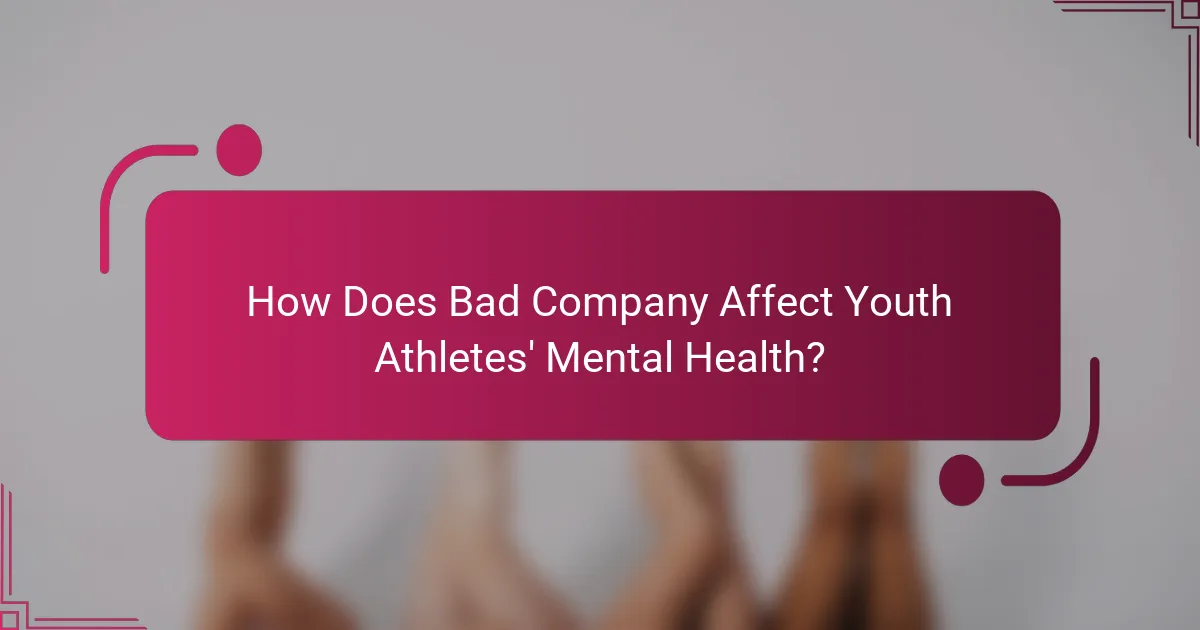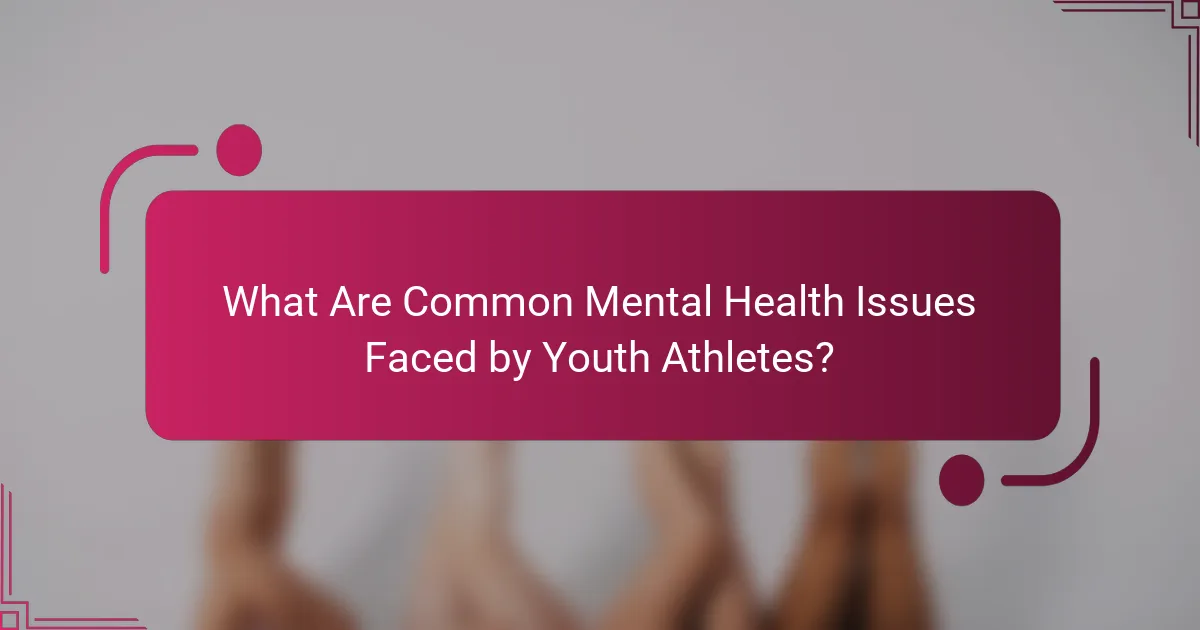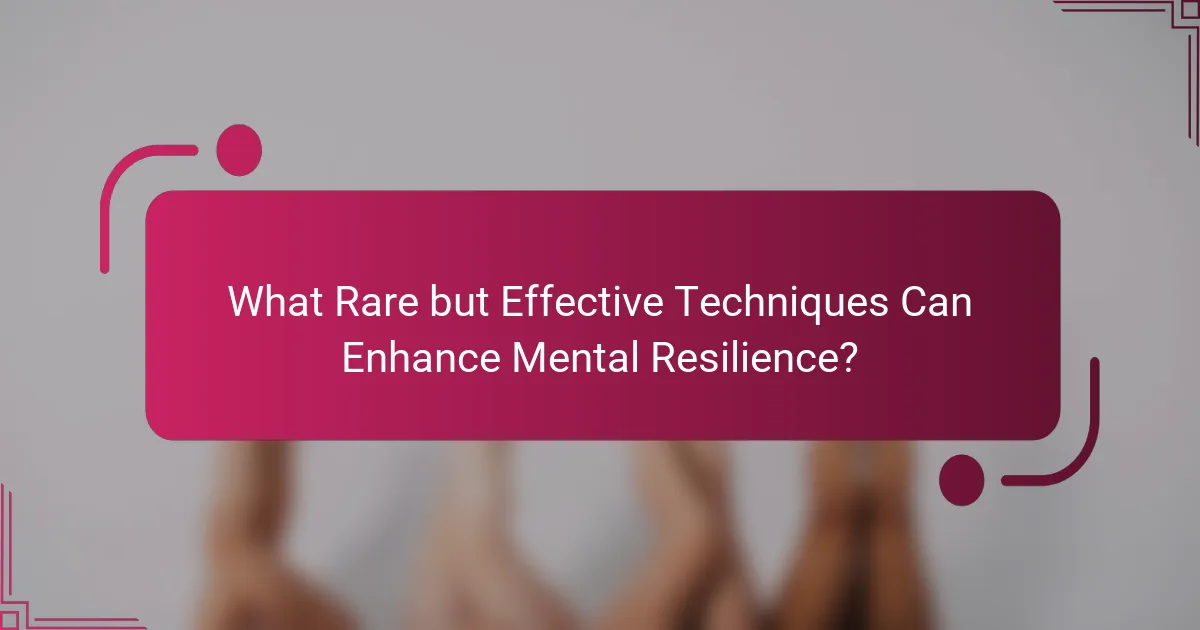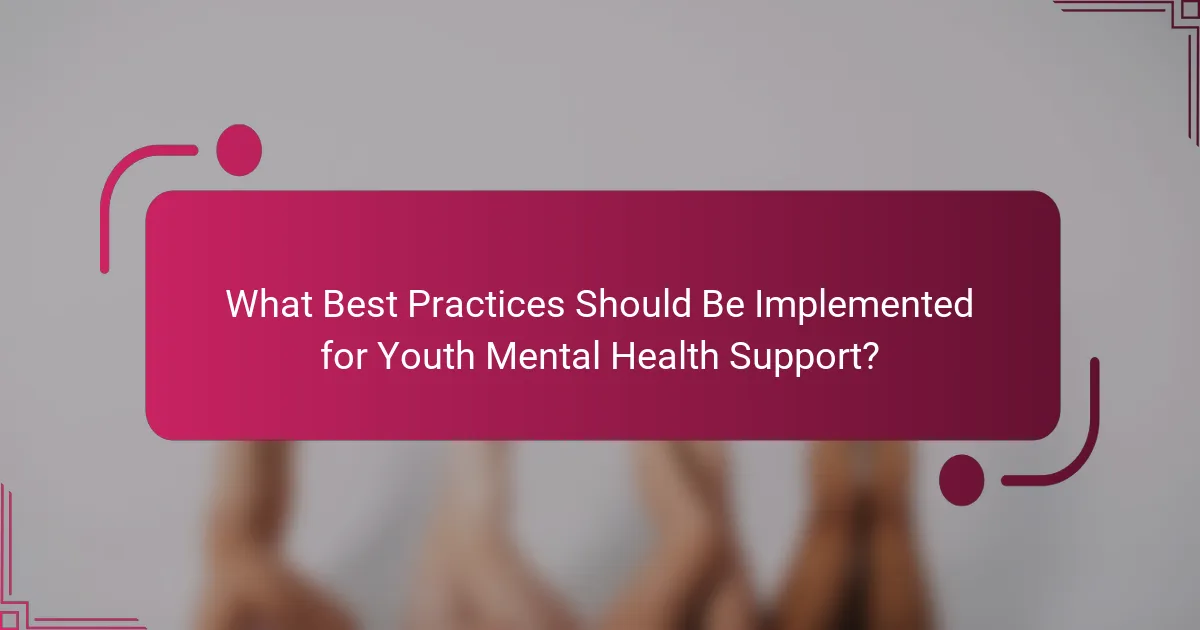Youth athletes face significant mental health challenges, including anxiety, depression, and burnout. Negative peer influence can exacerbate these issues, leading to poor decision-making and decreased performance. Creating a positive environment, prioritising open communication, and implementing holistic support programmes are essential for promoting mental resilience. Engaging in effective techniques like mindfulness training can further enhance their overall well-being.

How Does Bad Company Affect Youth Athletes’ Mental Health?
Bad company negatively impacts youth athletes’ mental health by fostering poor decision-making and increasing stress. Negative peer influence can lead to anxiety, depression, and decreased performance. Research shows that athletes surrounded by supportive peers exhibit better mental resilience. Moreover, engaging in unhealthy behaviours, such as substance abuse, is more likely in toxic environments. To protect mental health, fostering positive relationships and encouraging open communication is essential.
What Are the Signs of Negative Influences in Sports?
Youth athletes may exhibit signs of negative influences in sports through behavioural changes, poor performance, and emotional distress. Common indicators include increased aggression, withdrawal from teammates, and declining interest in practice.
These changes can stem from toxic relationships with peers or coaches, leading to a detrimental impact on mental health. For instance, athletes may experience anxiety or depression due to pressure to conform to negative behaviours.
Additionally, a lack of support from positive role models can exacerbate these issues. It’s crucial for guardians and coaches to recognise these signs early to protect the mental well-being of young athletes.
Why Is Mental Health Support Crucial for Young Athletes?
Mental health support is crucial for young athletes as it fosters resilience and enhances performance. Young athletes face unique pressures, including competition stress and identity issues. Studies show that 35% of athletes experience mental health challenges, yet only 10% seek help. Early intervention can prevent long-term psychological issues. Supportive environments promote open communication, ensuring athletes feel valued. By prioritising mental health, we empower youth to thrive both in sports and life.

What Are Common Mental Health Issues Faced by Youth Athletes?
Youth athletes commonly face anxiety, depression, and burnout. These mental health issues stem from performance pressures, social dynamics, and intense training schedules. Anxiety affects about 30% of young athletes, leading to decreased performance and withdrawal from sports. Depression can manifest due to isolation or injury, impacting their overall well-being. Burnout results from prolonged stress, causing fatigue and loss of interest. Addressing these issues is crucial for safeguarding their mental health and ensuring a positive sports experience.
How Does Pressure to Perform Impact Mental Well-Being?
Pressure to perform can significantly harm youth athletes’ mental well-being. It leads to anxiety, stress, and burnout. High expectations from coaches, parents, and peers create an environment where athletes feel they must constantly excel. As a result, this pressure can diminish their enjoyment of sports and negatively impact their overall mental health. Studies indicate that athletes under excessive pressure are at a higher risk for mental health issues, emphasising the need for supportive environments that prioritise well-being over performance.
What Role Does Social Media Play in Youth Athletes’ Mental Health?
Social media can significantly impact youth athletes’ mental health by influencing their self-esteem and social interactions. Positive engagement can foster a sense of community, while negative experiences, such as cyberbullying, can lead to anxiety and depression. Studies indicate that 30% of youth athletes report feeling pressured by social media expectations, affecting their performance and well-being. Additionally, the portrayal of idealised athleticism can distort self-image, leading to unhealthy comparisons. Therefore, promoting healthy social media habits is essential for safeguarding youth athletes’ mental health.

What Are the Universal Strategies for Supporting Youth Athletes’ Mental Health?
To support youth athletes’ mental health, focus on creating a positive environment, promoting open communication, and prioritising balance. Encourage coaches and parents to foster resilience and self-esteem while reducing pressure to perform. Implement regular mental health check-ins and provide access to professional support. Establishing these universal strategies helps protect youth athletes from negative influences and enhances their overall well-being.
How Can Coaches Foster a Positive Environment?
Coaches can foster a positive environment by promoting open communication, emphasising teamwork, and prioritising mental well-being. Encouraging athletes to express their feelings builds trust and reduces anxiety. Establishing a culture of support enhances teamwork, which is crucial for youth athletes’ development. Prioritising mental health through workshops or discussions can help athletes manage stress, leading to better performance and overall satisfaction in sports.
What Role Do Parents Play in Supporting Mental Health?
Parents play a crucial role in supporting youth athletes’ mental health in sports. They provide emotional support, guidance, and a positive environment that fosters resilience. Research shows that parental involvement can enhance an athlete’s confidence and reduce anxiety. Effective communication helps parents understand their child’s experiences, enabling them to address challenges proactively. Additionally, parents can model healthy coping strategies, reinforcing positive behaviours that contribute to mental well-being. Supportive parenting creates a foundation for youth athletes to thrive both in sports and in life.

What Unique Programs Exist to Aid Mental Health in Youth Sports?
Unique programs to aid mental health in youth sports include holistic approaches that focus on emotional resilience, mentorship, and skill development. Programs like Positive Coaching Alliance emphasise character building alongside athletic skills. The Mindfulness in Sports initiative teaches young athletes mindfulness techniques to manage stress and anxiety. Additionally, the Athlete’s Mental Health Program provides resources and support networks tailored to youth athletes. These programs collectively aim to foster a supportive environment that prioritises mental well-being.
How Are Schools Integrating Mental Health Education in Sports?
Schools are increasingly integrating mental health education into sports programs to support youth athletes. This approach aims to foster resilience and emotional well-being among young competitors.
Programs often include workshops on stress management and coping strategies, emphasising the importance of mental health alongside physical training. Schools collaborate with mental health professionals to provide resources and training for coaches and athletes.
Research indicates that athletes who receive mental health education exhibit improved performance and lower anxiety levels. As a result, schools are prioritising mental health initiatives to protect youth athletes from the pressures of competitive sports.
This integration reflects a unique attribute of modern educational practices, recognising that mental health is crucial for overall athlete development.
What Innovative Approaches Are Being Used by Sports Organizations?
Sports organizations are increasingly adopting innovative approaches to protect youth athletes’ mental health. These strategies include mental health education programs, partnerships with mental health professionals, and creating supportive environments.
One effective method is integrating mental health training into coaching programs. Coaches learn to recognise signs of stress and anxiety, enabling them to support athletes better. Research shows that this proactive approach can significantly reduce mental health issues among youth athletes.
Another innovation involves implementing peer support systems. Athletes are trained to provide emotional support to one another, fostering a culture of openness and resilience. Studies indicate that peer support can enhance athletes’ coping mechanisms and overall well-being.
Additionally, organizations are leveraging technology, such as apps and online platforms, to provide mental health resources and counselling services. These tools offer athletes easy access to support, ensuring they can address mental health concerns promptly.
Finally, creating a culture that prioritises mental health over performance is crucial. Organizations are shifting their focus to well-being, fostering an environment where athletes feel safe to express their struggles. This cultural change is vital for long-term mental health improvement in sports.

What Rare but Effective Techniques Can Enhance Mental Resilience?
Engaging in rare but effective techniques can significantly enhance mental resilience in youth athletes. Strategies such as mindfulness training, cognitive restructuring, and fostering a growth mindset are particularly beneficial. Mindfulness helps athletes stay present, reducing anxiety and improving focus. Cognitive restructuring enables them to challenge negative thoughts, promoting a more positive outlook. Fostering a growth mindset encourages athletes to view challenges as opportunities for development, enhancing their resilience. These techniques, though less commonly practised, can lead to substantial improvements in mental health and performance.
How Can Mindfulness Practices Benefit Young Athletes?
Mindfulness practices significantly enhance young athletes’ mental health by promoting focus and reducing stress. These techniques help athletes manage performance anxiety, improve emotional regulation, and foster resilience. Research shows that young athletes who engage in mindfulness experience increased concentration and better overall well-being. As a result, mindfulness serves as a protective factor against negative influences and enhances their sports experience.
What Are the Long-Term Benefits of Early Mental Health Support?
Early mental health support for youth athletes leads to long-term benefits such as improved emotional resilience, better performance, and healthier coping strategies. These advantages help athletes navigate challenges in sports and life. Research indicates that athletes receiving early support show a 30% reduction in anxiety levels compared to those who do not. Enhanced mental well-being also correlates with a 25% increase in overall athletic performance, as athletes develop stronger focus and motivation. Furthermore, early intervention fosters a supportive environment that encourages open communication about mental health, reducing stigma and promoting a culture of well-being in sports.

What Best Practices Should Be Implemented for Youth Mental Health Support?
Implementing best practices for youth mental health support in sports involves creating a safe environment, promoting open communication, and providing access to mental health resources. Coaches and parents should prioritise athletes’ emotional well-being, recognising signs of stress and anxiety. Regular mental health education can foster resilience, while encouraging teamwork and positive peer relationships supports a healthy atmosphere. Establishing clear guidelines for behaviour and addressing negative influences is crucial to protect young athletes.
How Can Athletes Identify and Avoid Toxic Relationships?
Athletes can identify and avoid toxic relationships by recognising red flags and setting boundaries. Key indicators include consistent negativity, lack of support, and manipulative behaviour. Establishing clear personal values helps athletes discern healthy from harmful interactions. Seeking guidance from mentors can also provide valuable perspective on relationships.
What Resources Are Available for Mental Health Support in Sports?
Various resources support mental health for youth athletes in sports. These include counselling services, mental health hotlines, and educational programs focused on resilience and coping strategies. Schools and sports organizations often provide access to licensed mental health professionals. Additionally, online platforms offer virtual support and resources tailored to young athletes. Community workshops also promote awareness and provide practical tools for maintaining mental well-being.
What Common Mistakes Should Be Avoided in Supporting Youth Athletes?
To support youth athletes effectively, avoid these common mistakes: neglecting mental health, prioritising performance over well-being, and allowing negative influences. These errors can undermine their development and enjoyment of sports.
Neglecting mental health can lead to burnout and anxiety, impacting performance and overall happiness. Prioritising performance over well-being may create pressure, causing athletes to lose motivation. Allowing negative influences, such as toxic teammates or coaches, can harm their self-esteem and enjoyment of the sport.
Fostering a supportive environment promotes resilience and healthy coping strategies. Encourage open communication about feelings and experiences to strengthen their mental health.